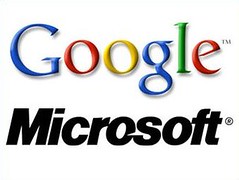 I don't get it. Technology journalist Robert X. Cringely, whose work I typically greatly admire, had a confusing editorial in the New York Times yesterday entitled "Chrome vs. Bing vs. You and Me" in which he makes what appear to me to be contradictory statements about the impact of the Google-Microsoft wars. Commenting on Google's recent move into the OS world and Microsoft's launch of Bing, its new and improved search platform, Cringely argues:
I don't get it. Technology journalist Robert X. Cringely, whose work I typically greatly admire, had a confusing editorial in the New York Times yesterday entitled "Chrome vs. Bing vs. You and Me" in which he makes what appear to me to be contradictory statements about the impact of the Google-Microsoft wars. Commenting on Google's recent move into the OS world and Microsoft's launch of Bing, its new and improved search platform, Cringely argues:
This is all heady stuff and good for lots of press, but in the end none of this is likely to make a real difference for either company or, indeed, for consumers. It's just noise -- a form of mutually assured destruction intended to keep each company in check.
That statement itself is hopelessly contradictory. If two companies are engaged in such a heated war "to keep each [other] in check," isn't that by definition something that could make a difference for consumers? Indeed, what Cringely goes on to say seems to confirm that in my mind:
So why does Google even bother? To keep Microsoft on its toes. [...]
So Google Chrome and Chrome OS and Android are all intended to keep Microsoft on the defensive and less likely to push its own Big Red Button. This makes even more sense given the recent advent of Microsoft's Bing search technology, which performs precisely the same competitive control function against Google. Bing hasn't a hope of toppling Google as the premier search engine and Microsoft knows it. To date, Bing's success has actually been at the expense of Google's competitors, not Google itself. But thanks to Microsoft's deep pockets and fierce screwball reputation, Bing has already accomplished its main purpose: reminding Google executives who they're messing with.
Hey, what's wrong with all of this?! Of course, it may be true, as Cringely argues, that, "Some company with a new idea and no legacy products to defend will eventually arise to clean Microsoft's clock. Or maybe Microsoft's market will simply disappear as PC's are subsumed into cars and mobile phones, possibly leaving Windows behind in the process." But what's wrong with Google putting the pressure on in the meantime? And why shouldn't we love the sound of Microsoft putting more pressure on Google with Bing? I've been using Bing a lot lately (I've made it my new Firefox search default, in fact) and have been very impressed. Even if it doesn't win back market share lost to Google in recent years, it really does keep Google on its toes and innovating. And that's a great thing.
Moreover, what would Cringely prefer? For both companies to just cede traditional territory to the other and roll over and play dead? I'm not sure how that would benefit anyone.
His confusing editorial ends with still more contradiction, arguing that, until some other independent innovators arise to truly topple Microsoft and Google, "these [two] companies will posture, spend a little money on research and development, and keep each other in check, while reporters and publications pretend that it matters." Again, Robert, it does matter. The money spent on R&D (which is not "a little" amount, I might add) and the pressure they place on each other by encroaching on each other's core competencies, is important to the market, consumers, and future innovation. Cringely should be praising these developments, not complaining about them.
